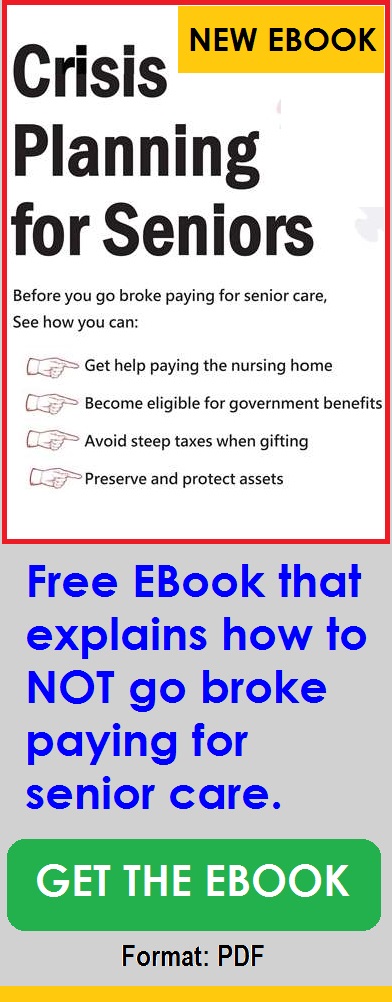Avoid Medi-Cal Recovery
_________________________________________________________________________________________________________________________
For an elderly resident receiving Medi-Cal benefits in a skilled nursing home, or other community care programs, Medi-Cal benefits are like a loan. After time of death, Medi-Cal (the State) will ask to be reimbursed (from the decedants estate) for the direct funds spent on care. This is called an "Estate Recovery".
The best way to avoid an estate claim is to have nothing in the Medi-Cal beneficiary's estate at the time of death. The State can only claim for the amount of Medi-Cal benefits paid or the value of the estate, whichever is less. The "estate" is composed of what is in the beneficiary's name at the time of death. Minimizing the estate at the time of death will minimize the amount of the claim.
The main asset in the estate is often the home. Thanks to the new laws effective January 1, 2017, protecting the home from a Medi-cal Recovery is easier than ever.
Old Medi-Cal Recovery Law:
For the past 20+ years, California law has allowed claims on the estates of those who received any Medi-Cal benefits when they were 55 years of age or older, regardless of the medical services received or whether recipients were in a nursing home. After the Medi-Cal recipient died, the state would send the heirs or survivors an “estate recovery claim” asking for payment for the amount of Medi-Cal benefits paid on behalf of the deceased individual.
While the state did not put a lien on the home and the state did not automatically take away the home it would try to collect, and, if the estate could not get the claim waived and could not afford to pay, the state would often negotiate a “voluntary lien."
After January 1, 2017
____________________________________________________________________________________________________________
NEW MEDI-CAL RECOVERY LAWS THAT ARE EFFECTIVE FOR THOSE INDIVIDUALS WHO DIE ON OR AFTER JANUARY 1, 2017.
The new Recovery Bill:
• Prohibits claims on the estates of surviving spouses, registered domestic partners and minor and/or disabled children;
• Surviving spouse/Registered Domestic Partner: After January 1, 2017, if the Medi-Cal recipient is survived by a spouse or a registered domestic partner, a claim is prohibited and forever barred. However, if the surviving spouse or registered domestic partner also received Medi-Cal services subject to recovery, his/her estate can be subject to an estate claim after his/her death.
•Surviving Minor/Disabled Children: If the Medi-Cal recipient is survived by a minor child (under age 21), the state cannot recover, and a claim is forever barred. If the Medi-Cal recipient is survived by a disabled child of any age, the state cannot recover, and a claim is forever barred. The child does not need to be living with the Medi-Cal recipient, or be an heir to the estate. This is current law and was not changed by the new statutes.
• Limits recovery for those 55 years of age or older to nursing home and Home and Community Based Services;
• Limits recovery to only those assets subject to California probate;.
• The state can make a claim against your estate for the amount of the Medi-Cal benefits paid or the value of the estate, whichever is less.
• For those who die on or after January 1, 2017, recovery is limited to those estates that are subject to probate under California law.
• Restricts the amount of interest that the state can charge on liens;• Requires the state to waive the claim as a substantial hardship when the estate subject to recovery is a homestead of modest value, i.e., a home whose fair market value is 50 percent or less of the average price of homes in the county where the homestead is located.
Which Medi-Cal Beneficiaries are Subject to Recovery?
________________________________________________________________________________________________________________
For those individuals who die on or after January 1, 2017, Medi-Cal recovery is limited to:
• Beneficiaries who were 55 or older when they received Medi-Cal benefits for nursing facility services, certain home and community based services and related hospital and prescription drugs.
• Beneficiaries who were under age 55, if they were “permanently institutionalized” in a nursing facility, intermediate care facility or other medical institution and for whom, after notice and opportunity for hearing, it was determined that they cannot reasonably be expected to be discharged and return home.
What Property is Exempt from an Estate Recovery Claim?
__________________________________________________________________________________________________________________
For individuals who die on or after January 1, 2017, the following property is exempt from an estate recovery claim:
• Property transferred prior to death – no longer in the beneficiary’s name.
• Property not subject to probate, e.g., living trusts, joint tenancies, survivorship, life estates, mobile homes, and other manufactured homes.
• Homestead of modest value: a home whose fair market value is 50% or less of the average price of homes in the county where the homestead is located, as of the date of the decedent’s death. (Note: this is a new hardship waiver, and if the waiver applicant can prove this is a “homestead of modest value,” the state is required to waive the claim. Policies and procedures on how to determine the value have not yet been developed, but these should be in place by 1/1/2017.)
• Life insurance: You name one or more beneficiaries on your life insurance policy. *
• Retirement accounts: You name a beneficiary on your retirement account(s). *
***Unless the estate is the named beneficiary or it reverts to the estate.
For life insurance and retirement accounts, always check to make sure you have named one or more living beneficiaries.
Receive quick answers to questions regarding Medi-Cal Benefits
Call today for more information 877-773-3535
or 559-441-1121


